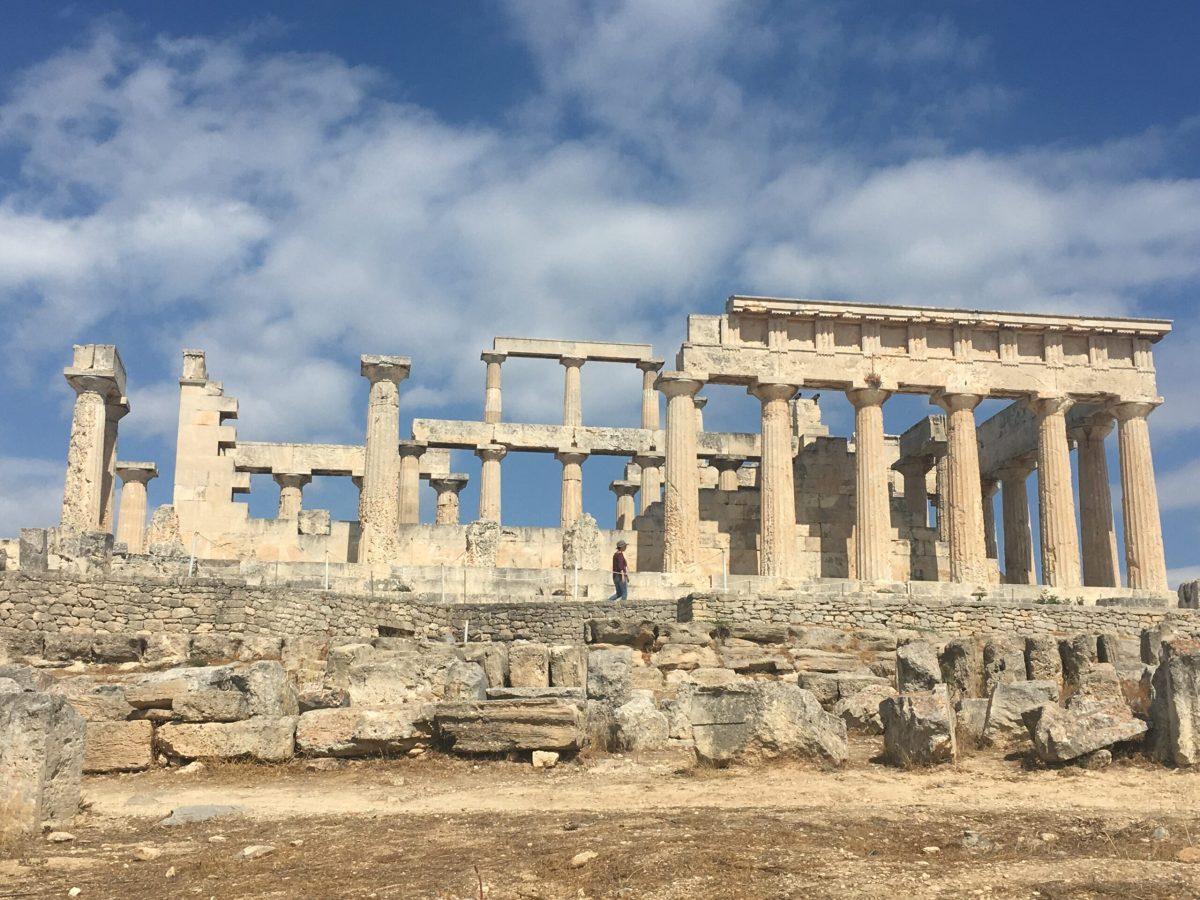1. Traveling Opportunities!
For a frequent traveler like me, the number one reason I wanted to study abroad in Europe was the ability to travel to other countries for cheap. From Greece, I can book round-trip flights for less than $50 to places like Rome, Israel, London, Istanbul and others. So far, I’ve booked weekend trips to Moldova, Turkey and Amsterdam, without breaking the bank entirely.
Just about every study abroad program also offers excursions that are entirely free, too! Last weekend we went to the island of Aegina and visited the Temple of Aphaia, then swam in the crystal clear waters of the Mediterranean while waiting for our free meal at a restaurant on the beach. Later in the semester, there are free excursions to Thessaloniki and Nafplio, two sizable cities in Greece. Studying abroad means more than picking one city and staying there.
2. Learn a Language!
I’ve taken classes in Latin, French and Spanish during college and high school, but never found that I could grasp the language well enough to hold conversations, and soon lost my skills. But now I’m studying Modern Greek and I have the chance to practice my speaking skills literally everywhere I go! I became fluent in reading the alphabet just by walking around pronouncing street signs, and sometimes I can get through a grocery store transaction entirely in Greek.
In countries like France and Spain, native speakers are said to have little patience with new speakers, and it can be intimidating to even try. In Greece, that is not the case! Greeks know their language is difficult and, generally, they will appreciate any attempt by an outsider to speak their language, and they’ll even help you out with it.
And finally, if you have no interest in learning the local language and are instead worried about the language barriers you will undoubtedly encounter, you’re not alone. But with the right mindset, language barriers just become fun challenges, and you can overcome them with translation apps, clever miming, help from others and some patience. Our world is becoming smaller, so the ability to communicate with people who don’t speak your language is actually an incredibly useful skill to have, and once you live in a foreign country for four months, you’ll be an expert.
3. Make New Friends!
Something that stops people from studying abroad, and traveling in general, is the prospect of doing it alone. I’ve learned it’s nearly impossible to get your friends to travel with you and, for a lot of people, that stops them from traveling altogether. Instead of waiting around for someone to decide to go with me, I started going places alone, and it’s been the most rewarding experience of my life.
I’ll admit, I was lonely for the first week or so, but eventually, I realized I had to take initiative to meet friends and not simply wait around for someone to talk to me, the way I might if I was somewhere that I knew everyone. I started hanging out with my suitemates more often, I talked to people in the cafeteria who were also sitting alone and I went to “Theatre in the Making Club,” which is when I finally started to feel accepted and at home, because I was around like-minded people, and frankly, theater kids are the same everywhere.
It may be hard at first, but starting from a blank slate like that means you will have the opportunity to meet more new people, especially when compared to someone who came with a group of friends they already knew. “Solo travel” is really a misnomer; I’m almost never alone when I travel, because there’s always someone new to get to know and bond with.
4. Immerse Yourself in a New Culture!
I am American-born, American-raised, without a drop of any other culture in my life growing up, so when I started to learn about other countries and their respective cultures, I was fascinated. While in Greece, I’ve decided to try to live like a Greek, rather than like an American in Greece.
They’re a lot more laid-back here, which means everything takes an hour longer than it needs to, so patience is key. And just like they have siesta in Spain, they have siesta in Athens from 3 p.m to 6 p.m. Napping during this time is crucial because dinner isn’t until 8 o’clock and can last hours, and then European nightlife doesn’t start until well past midnight. I’m still adjusting to this new schedule, but it’ll be a lot easier to adjust to the culture shock if you’re able to be flexible.
I’m also trying to eat like the Greeks do, which is to say, healthier. I’ve gained a taste for tomatoes and onions, as well as a borderline addiction to tzatziki sauce. At the moment, I’ve been going to the same souvlaki restaurant called MILF (which doesn’t mean what you think, it’s worse: Meat I Live For) almost every day for a week. But they only charge $3 for a delicious pork gyro that makes for a relatively healthy meal, so it’s definitely better than any fast food restaurant in America.

5. Better Weather
This one may be more specific to Greece and other places in southern Europe, but the weather here has been one of my favorite aspects. I’ve never liked cold weather in any form, so while the United States is bundling up for fall weather with sweaters and pumpkin spice lattes, I will still be walking around in sandals and shorts in the lovely 75 degree dry heat, and maybe even go down to the beach for a day to swim in the warm waters. And, there’s pumpkin spice lattes here too!
6. Get Out of Your Routine
When you’re living at home or at college, it’s easy to get into a routine that you go through every day, every week, every month. You go to the same places, hang out with the same people, cook the same three recipes in rotation if you’re me. This makes life more comfortable, but comfort is not a place for change.
When you’re thrown into a foreign country, those routines and distractions implode in front of your eyes. The people you spend all your time with? They’re not here. The restaurants you eat at, the stores you go to, your favorite coffee shop, they’re all gone too. When you have to figure out a new way to live, you’ll learn a lot about yourself in the process. Your routines and distractions aren’t there to hide behind, so old issues and insecurities you’ve been ignoring will start to resurface, and that can be difficult.
But this is your chance to confront all the repressed parts of yourself, and you’ll be better for it. And who knows? Maybe you’ll find that your life while studying abroad fits you better than the routine you had before. You don’t have to move abroad forever, but you can take the lessons you learn there and apply them when you go home.
For comments/questions about this story, email [email protected] or tweet @TheWhitOnline.

























































































































































!["Working with [Dr. Lynch] is always a learning experience for me. She is a treasure,” said Thomas. - Staff Writer / Kacie Scibilia](https://thewhitonline.com/wp-content/uploads/2025/04/choir-1-1200x694.jpg)









































